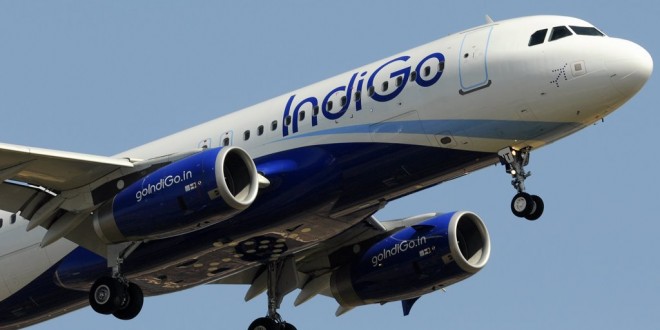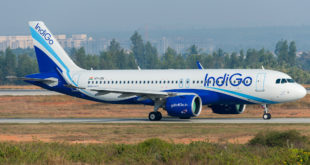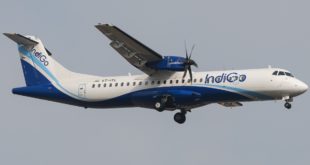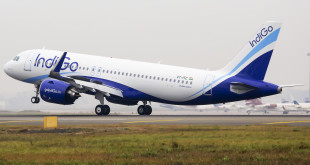In 2005, Gurgaon, India based low fare carrier IndiGo stunned the Indian civil aviation world by signing an order for 100 Airbus A320 aircraft. On Wednesday, the airline stunned the global aviation aviation by signing a Memorandum of Understanding with airframer Airbus S.A.S. for the largest ever large jet order.
IndiGo which is owned by InterGlobe Aviation Pvt. Ltd., will procure an additional 180 Airbus A320 single aisle aircraft of which 150 will be the A320neo’s and 30 will be A320s.
As reported by Bangalore Aviation five weeks ago, the carrier will become the launch customer for the Airbus A320neo (new engine option).
The order valued around $15 billion at list prices surpasses previous mega deals of Abu Dhabi based Etihad with Airbus in 2008 ($12 billion) and Dubai based Emirates Airline again with Airbus in 2010 ($11.5 billion).
Deliveries of the new order are expected to commence in 2016 and continue till 2025. The airline has an existing order for 100 Airbus A320’s which are expected to be delivered by 2015.
The airline current all A320 fleet is powered by the IAE V2500 engine and should be used for the 30 new A320s ordered.
 A choice of engine manufacturer for the A320neo has not yet been announced, though the airframer Airbus did release a computer rendition of an IndiGo liveried A320neo fitted with the Pratt and Whitney Geared Turbo Fan engine.
A choice of engine manufacturer for the A320neo has not yet been announced, though the airframer Airbus did release a computer rendition of an IndiGo liveried A320neo fitted with the Pratt and Whitney Geared Turbo Fan engine.
The current domestic fleet of all Indian carriers is around 420 aircraft, and this large order has many once again enquiring on the size of the order, speculating on how IndiGo would finance this purchase, and where would it plan to use a potentially large fleet of 280 aircraft.
The existing 100 A320 order
The Indian domestic aviation market is growing at double digits. Till now business travel formed the bulk of air travel, but the leisure segment which is driven by low fares and value for money is significant driver for future growth. Indian domestic carriers are just scratching the surface, transporting just about 1% of the total travelling public. Both Boeing and Airbus predict the Indian aviation market growing by up to another 1,000 aircraft from its current ninth place globally to third largest by 2027.
With its growing fleet, IndiGo is also growing its market share. It is now the third largest domestic carrier in India and has market dominance firmly on its long term agenda.
Its multi-million dollar initial public offering, expected later this year, will provide further financial impetus to its ambitious growth plans.
The existing order will provide the carrier capacity for the short term. While not yet confirmed, given the airline’s relentless drive to reduce costs, it is certain that the balance aircraft in existing 100 A320 order will be converted to those fitted with large blended wing tip devices called “Sharklets” when Airbus commences deliveries in 2013.
The A320neo internationally
IndiGo has expressed intent to commence flying internationally to South, South East and South West Asia from August this year when it become eligible.
The A320neo, available from 2016, incorporates new more efficient engines and Sharklets delivering fuel savings of up to 15%. The A320neo is expected to offer up to 500nm (950 km) more range or two tonnes more payload.
While the additional payload will help on domestic and short international routes, the longer range will help IndiGo gain an advantage over competing international low cost carriers like AirAsia, Thai AirAsia, flyDubai and Air Arabia.
At present the A320’s have an typical operational range of about 4 hours flying time. A320NEO adds a critical extra hour of flying time range thus allowing IndiGo to fly Delhi or Mumbai to Kuala Lumpur without payload penalties and without having to use the larger and more expensive twin aisles like the A330 which competitor AirAsia does.
The A320neo will also allow IndiGo to fly longer routes to Hong Hong, Singapore, Shanghai and possibly even Istanbul, which are again flown by larger more expensive aircraft.
The smaller A320neo’s will allow IndiGo greater flexibility, lower costs, and higher passenger load factors thus allowing the carrier to break-even on its international routes much faster than its competitors.
This order also lays to rest speculation that IndiGo would be ordering A330’s for its international operations. Sources within the airline indicated that the airline has no plans to induct the twin-aisle A330 for the foreseeable future.
Parking
One of the concerns being voiced is the growing overcrowding at Indian airports, especially a lack of overnight parking space. IndiGo, though, is confident that the on-going expansion activities at various airports across the nation will provide the required space. With an expected thrust on international flights, the airline will increase use of its fleet during the night hours. The airline is also busy expanding operations to many tier II airports, stationing aircraft overnight at cities like Trivandrum, Kochi, Ahmedabad, etc. for early morning flights to the tier I cities where parking is a constraint.
The order is not all for IndiGo
Rakesh Gangwal and Rahul Bhatia, co-founders of IndiGo are known for the business savvy. From the existing 100 aircraft order the airline has taken total delivery of 39 A320’s, but only 34 into its fleet. Five aircraft (15%) have returned to lessors or have been diverted to other airlines who pay about $5~$10 million premium per aircraft for a faster delivery. IndiGo does a sale and lease-back of its entire fleet, and keeps rotating aircraft to keep long term maintenance costs low. Expect a similar trend to continue.

So look forward to IndiGo continuing its pace of adding one new aircraft every three to four weeks. Who said that India cannot have its own version of RyanAir or Southwest?
 Bangalore Aviation News, Reviews, Analysis and opinions of Indian Aviation
Bangalore Aviation News, Reviews, Analysis and opinions of Indian Aviation




One comment
Pingback: American Airlines announces largest aircraft order in aviation history. Tops IndiGo and AirAsia - Bangalore Aviation